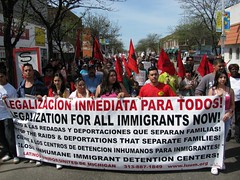
May Day demonstration in southwest Detroit drew thousands of mostly youth to emphasize immigrant rights and support for working people in general. (Photo: Alan Pollock)
Originally uploaded by Pan-African News Wire File Photos
Media Advisory
Event: "Made in L.A." Documentary Film/Fundraiser
Date: Friday, May 15, 7:00-9:00 p.m.
Location: 5920 Second Avenue, Near Antoinette (WSU Area)
Contact: 313.671.3715, 887.4344
E-mail: ac6123@wayne.edu
URL: http://www.peoplessummit.org
Film: http://www.madeinla.com
Donation: $5 or what you can afford
People's Summit Planners Highlight Immigrant Workers Struggle in Groundbreaking Documentary to be Shown on May 15, 7:00-9:00 p.m.
Made in L.A. is an Emmy award-winning feature documentary (70 min) that follows the remarkable story of three Latina immigrants working in Los Angeles garment sweatshops as they embark on a three-year odyssey to win basic labor protections from trendy clothing retailer Forever 21. In intimate observational style, Made in L.A. reveals the impact of the struggle on each woman’s life as they are gradually transformed by the experience. Compelling, humorous, deeply human, Made in L.A. is a story about immigration, the power of unity, and the courage it takes to find your voice.
Lupe Hernandez, a five-foot tall dynamo who learned survival skills at an early age, has been working in Los Angeles garment factories for over 15 years since she left Mexico City at age 17. Maura Colorado left her three children in the care of relatives in El Salvador while she sought work in L.A. to support them. She found that the low-paid work came with a high price - wretched conditions in the factories and an "undocumented" status that deprived her of seeing her children for over eighteen years. María Pineda came to Southern California from Mexico in hopes of a better life at 18, with an equally young husband. Twenty three years later, substandard working conditions, a meager salary and domestic abuse have left her struggling for her children's future and for her own human dignity.
These three women, along with other immigrant workers, come together at L.A.'s Garment Worker Center to take a stand for their rights. Against all odds, these seemingly defenseless workers launch a very public challenge (a lawsuit and a boycott) to one of the city's flagship clothiers, calling attention to the dark side of low-wage labor north of the U.S.-Mexico border and revealing the social fault lines of the new globalization.
As seen through the eyes of María, Maura, and Lupe, the workers' struggle for basic economic justice and personal dignity yields hope and growth, but it is also fraught with disappointments and dangers. As the campaign drags on through three long years, meetings at the Garment Worker Center become more contentious and the women undergo dramatic moments of conflict and discouragement. But then the story takes a surprising turn, and the three women find the strength and resources to continue their struggle.
For Lupe, Maura and María, the long campaign is a turning point from victimization to empowerment, and each makes life-changing decisions that they never could have envisioned. Overlooking the city of Hong Kong, where she has traveled after she's hired as an organizer, Lupe reflects on her journey: The more I learn, the lonelier I feel. Ignorance somehow protects you. But then I say, I've come this far, and nothing can take that away from me.
No comments:
Post a Comment